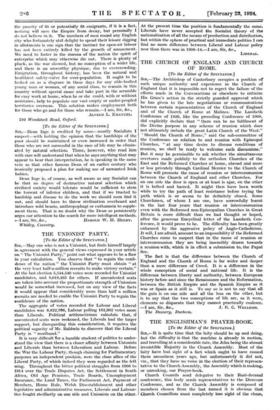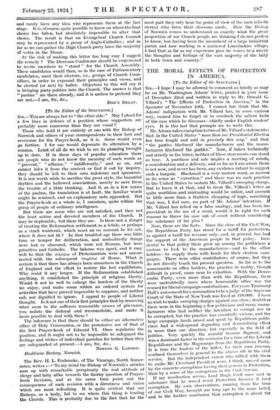THE ENGLISHMAN'S PRAYER-BOOK. [To the Editor of the SPECTATOR.] Sm,—It
is quite time that the laity should be up and doing, but the difficulty is that the machine is already in motion, and travelling at a considerable rate, the Jehu being the almost irresistible Majority in the Church Assembly. Most of the laity have lost sight of a fact which ought to have caused them uneasiness years ago, but unfortunately it did not, viz., that they have no voice in the election of their represen- tative to the Church Assembly, the Assembly which is making, or ymmaking, our Prayer-book.
Church Councils send delegates to their Ruri-decanal conference, this body sends representatives to the Diocesan Conference, and as the Church Assembly is composed of members -chosen from the last named it is obvious that Church Councillors must completely lose sight of the chase, and rarely have any idea who represents them at the last stage. It is, of course, quite possible to know on whom the final choice has fallen, but absolutely- impossible to alter that choice. The result is that an Evangelical Church Council may be represented by a group of Anglo-Catholics ; and as far as we can gather the High Church party have the majority of votes in the House.
At the risk of making this letter too long may I suggest the remedy ? The Diocesan Conference should be empowered to invite members to " stand " for the Church Assembly. These candidates would then, as in the case of Parliamentary candidates, meet their electors, i.e., groups of Church Coun- cillors, in order to expound their principles and views, and be elected (or not) by ballot. Objectors to this will say it is bringing party politics into the Church. The answer is that " parties " are there already, and it is useless to pretend they are not.—I am, Sir, &c.,
DON'T DELAY.











































 Previous page
Previous page